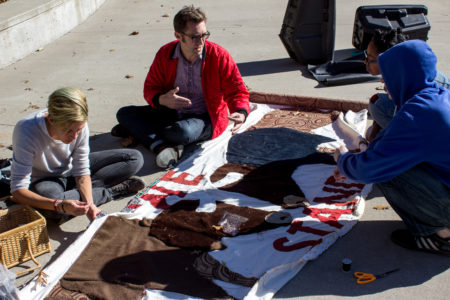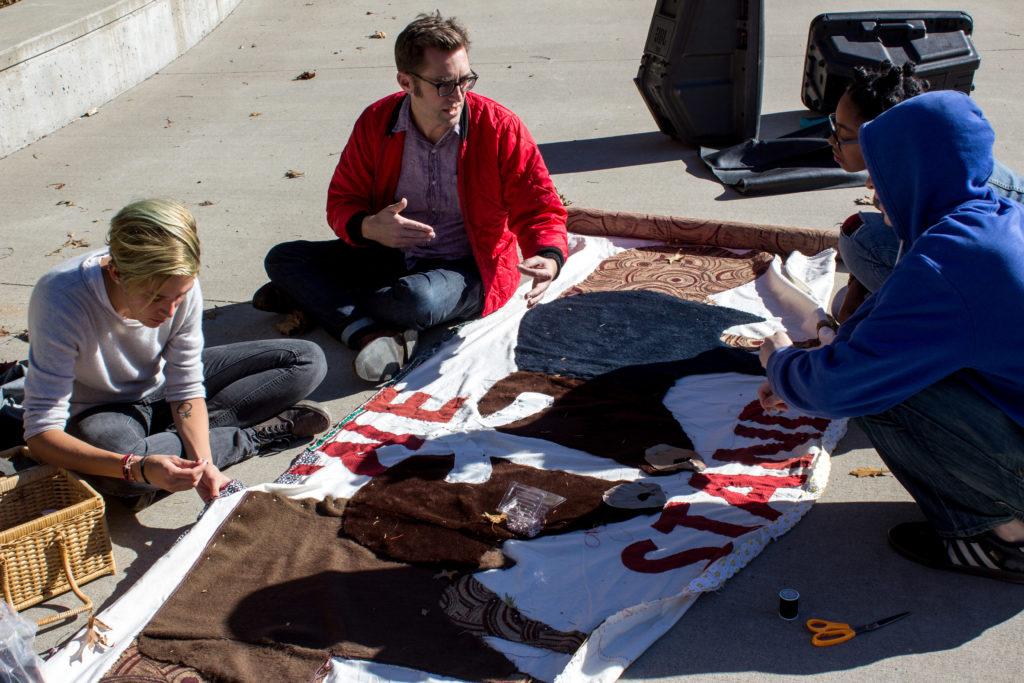By Keli Vitaioli
vitaioli@grinnell.edu
11 Grinnell students will make a supply trip to Standing Rock, ND beginning yesterday and returning Sunday. They will deliver banners, food, warm clothes and other donations that were collected and made in the week leading up to the trip. Planning began soon after massive support for the protests was expressed on Facebook, wherein people across the United States checked into Standing Rock as a response to rumors that the police had been using check ins to target protestors. Some students, including Annie Casey and Fintan Mason, both ’17, felt they had the means to organize.
“It started as a conversation in my kitchen … it just generated this organic conversation about what it means to stand in solidarity and what it means to show support,” Casey said. “We felt like it was a really powerful moment where people were cognizant of the issue for the first time in a really present way and linking themselves to that issue as a powerful statement, and we wanted to ask how we could do more.”
Members of the Standing Rock Sioux Tribe founded the Sacred Stone Protest Camp on April 1, 2015. Since the U.S. Army Corps of Engineers approval of the pipeline in July of 2015, protestors have faced responses from police in the form of tear gas and arrests and more violent cases of rubber bullets and stand offs with white militant groups.
The Standing Rock Sioux Tribe heads the protests. The 3.8 billion dollar Dakota Access Pipeline is attempting to run through land that belongs to the Tribe, according to the Fort-Laramie Treaty of 1851 and also native claims. More than 100 other tribes have joined the cause, along with other water protectors from across the country. Construction of the pipeline threatens drinking water, sacred sites and historic lands. The pipeline was previously purposed to run through predominantly white Bismarck, and when the inhabitants balked at the possibility of their water supply being threatened, it was shifted south into Native American land.
The Grinnell group has connections in Standing Rock that they are working to support. Casey has connected with a caravan from her home town that has organized food caravans to the protestors. Mason connected with Dena Eakle, whose farm he worked on this fall break in Wisconsin. Eakle is in the process of winterizing her camp and preparing the camp to persevere through a tough winter.
“[Eakle] is the one who pushed me to start thinking about this issue more and to be aware that we are all on native land and how important it is to stand up for people whose voices have been oppressed historically,” Mason said. “Our plan is to go out there and help her and the people she has brought with her to build a permanent camp to set up the tents, to possibly put together the stoves and whatever help they may need.”
As winter draws closer, there is optimism for the readjustment of the permits initially granting the land to the pipeline’s use, leaving protestors to play a “waiting game.”
The students were funded by the College’s Services group for 85 percent of their travel costs and one large meal, which they will prepare Saturday night for the protestors or donate in the form of perishable foods.
“This conversation arose in Food House, and what we have to give and what were good at doing is cooking meals for large numbers of people, so the idea sort of grew out of how do we demonstrate support through cooking a meal for people who might need it,” Casey said.
Preparations at Grinnell have expanded beyond the initial food preparation mission. Organizers found that support amassed from all areas of the community. Even alumni support has been notable, raising 2,500 dollars in donations.
“I think more than anything it has been amazing to see how many people are willing and enthusiastic to share their gifts. There are people in the art department who are sewing banners. With the community there are people designing t-shirts and making pins and gifting us baked goods and really using all the creative and intellectual capacity of this community to make this the best statement of support we can as a community,” Casey said.
Mason and Casey see this trip as based in the history of the College.
“It is our history as Grinnellians. Our history is rooted in direct action and protest and raising our collective voices when we find things that are unjust in this world, and that’s really our motivation as a community to show up and be there when it matters,” Casey said.
While the trip is one of support and the students will not be involved in any of the direct protests, there is still uncertainty as to what awaits them.
“No matter how much planning we’ve put into this there’s still this dark space come Thursday,” Mason said. “We just have no idea what to expect, but at the same time it just makes me feel even stronger that I need to be there this trip is really, really important.”
There is still a lot of important work that can occur behind the scenes within the Grinnell community.
“Make as much noise as possible in any way that you can — not everyone has to show up at the actual protest,” Mason said. “If you can, that’s great, but there’s still a lot of work that can be done behind the scenes.”





































































Mike Vitaioli • Nov 12, 2016 at 7:19 pm
The people as a whole are more important than the individual! On another note, I’m a firm believer that the President should be chosen by the Popular vote. In that regard, Hillary should be our President. As it stands, let’s give Trump a chance.